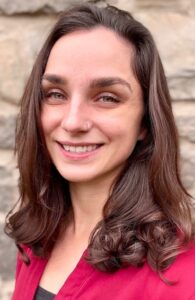Ashley Kobylarz
“Not a whole lot of us work with adults. They have really big needs.”
Ashley Kobylarz, BCBA
Ashley Kobylarz sees the rewards of working with adults with autism spectrum disorders who have “fallen through the cracks” and go on to live independent and fulfilling lives. “We do encounter some of those unfortunate cases where they did not receive the services they needed or were not eligible,” says Kobylarz, who is director of behavioral services at Community Access Unlimited in Elizabeth and an alumna of Caldwell’s master’s in applied behavior analysis (ABA) program. Many of her clients are adults who did not have insurance coverage for behavior analytical services as children or who have aged out of their coverage.

She points to the example of a woman she worked with who had trouble communicating her feelings and a tough time at her place of employment. Sometimes her behaviors were not safe; other times she would leave, not show up or call in. “Caldwell taught me functional communication and replacement behaviors,” said Kobylarz of how she used those skills with her client, who is now doing very well. “For the last year she has been consistently showing up to work and earning her paycheck.”
Many in the ABA field work with children. Working with adults is different, said Kobylarz. “They have really complex learning histories. Taking all that into consideration is really paramount to the people I service. Not a whole lot of us work with adults. They have really big needs.” At Community Access, she is part of a team that serves people with mental health concerns, helping them to recover from trauma and discrimination by providing affordable housing, training, advocacy and healing-focused services. Her responsibilities include life skills like teaching clients how to use public transportation, how to use a phone, showering consistently and training the staff in how to teach those skills.
After earning a bachelor’s degree in psychology at Centenary University, Kobylarz began her career providing direct support to adults in group homes. She was not familiar with ABA, but when she learned about it she decided to pursue her master’s. “I applied to Caldwell and realized that was exactly where I needed to be.” She is grateful to her Caldwell thesis advisor, Professor Ruth DeBar, who allowed her to explore research focusing on adults and their vocational skills. She worked at Caldwell’s Center for Autism and ABA which gives graduate students the opportunity to work hands-on with learners. The faculty and the experience helped her become the best service provider she could be. “They really prepared me for the critical thinking skills I need, especially in such a complex area of the field,” including problem-solving and thinking on the spot. She uses everything she learned from Caldwell’s faculty today. “I’m eternally grateful for their patience, skill and dedication in providing students with the best training out there. Caldwell made me everything I am today.”

